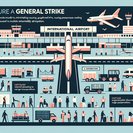
Cyprus’ air-transport lifeline came to a stand-still on 20 November when the island’s major trade-union confederations staged a three-hour general strike from 11:00–14:00. Airport operator Hermes Airports confirmed that 54 departures and arrivals—38 at Larnaca and 16 at Paphos—were either cancelled or rescheduled, affecting more than 15,000 passengers at the height of the business-travel window. Gulf carriers Jazeera Airways, Qatar Airways and Emirates cancelled round-trips altogether, while European legacy and low-cost airlines retimed services to avoid the closure window.
Although the walk-out was limited in duration, knock-on effects rippled well into the evening. Airlines struggled to reaccommodate disrupted passengers, and ground handlers reported queues at immigration counters as staff clocked back in. Freight forwarders shifted urgent belly-hold cargo via Athens and Istanbul, with handlers estimating additional costs of about €150 per pallet.
![Three-Hour Nationwide Strike Grounds or Delays 54 Flights at Larnaca and Paphos]()
The action is part of organised labour’s campaign to restore the cost-of-living-allowance mechanism that was suspended during the 2013–2015 financial crisis. Labour Minister Marianna Charalambous has promised to table a reform proposal by year-end, but union leaders warn that rolling 24-hour strikes could follow in December—coinciding with the winter tourism peak—if talks stall.
For mobility managers the episode underscores Cyprus’ vulnerability to industrial action: with no rail network and only seasonal ferry options, air transport remains the country’s single critical gateway for both executives and time-sensitive cargo. Corporates are advising assignees to build slack into itineraries, keep digital boarding passes handy for last-minute gate changes and monitor Hermes Airports’ real-time feed. Travel-risk consultancies continue to rate the security impact as low, but advise avoiding planned demonstrations outside parliament in Nicosia.
In the longer term, the strike will renew pressure on authorities to diversify transport links—including reviving a limited ferry connection to Greece—and to improve contingency staffing at passport control so that future stoppages do not paralyse international mobility.
Although the walk-out was limited in duration, knock-on effects rippled well into the evening. Airlines struggled to reaccommodate disrupted passengers, and ground handlers reported queues at immigration counters as staff clocked back in. Freight forwarders shifted urgent belly-hold cargo via Athens and Istanbul, with handlers estimating additional costs of about €150 per pallet.

The action is part of organised labour’s campaign to restore the cost-of-living-allowance mechanism that was suspended during the 2013–2015 financial crisis. Labour Minister Marianna Charalambous has promised to table a reform proposal by year-end, but union leaders warn that rolling 24-hour strikes could follow in December—coinciding with the winter tourism peak—if talks stall.
For mobility managers the episode underscores Cyprus’ vulnerability to industrial action: with no rail network and only seasonal ferry options, air transport remains the country’s single critical gateway for both executives and time-sensitive cargo. Corporates are advising assignees to build slack into itineraries, keep digital boarding passes handy for last-minute gate changes and monitor Hermes Airports’ real-time feed. Travel-risk consultancies continue to rate the security impact as low, but advise avoiding planned demonstrations outside parliament in Nicosia.
In the longer term, the strike will renew pressure on authorities to diversify transport links—including reviving a limited ferry connection to Greece—and to improve contingency staffing at passport control so that future stoppages do not paralyse international mobility.








